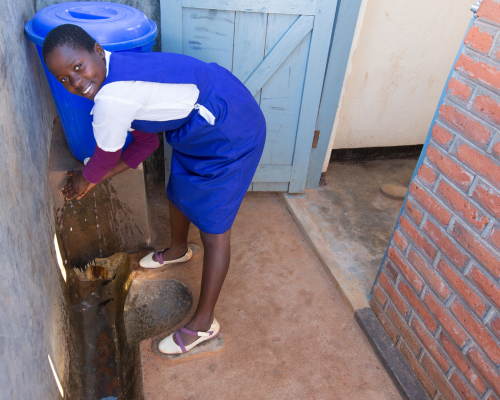Euvon, pictured here, has just washed her hands immediately after using a VIP latrine. Pupils are taught about the importance of this, and the facilities for doing so are located inside the gender segregated latrine compound. This is so that girls won’t feel shy, especially while menstruating which they don’t want the boys to know about.
Menstrual Hygiene Day takes place every year on the 28th of May. The annual awareness day started in 2014 with the purpose of breaking taboos surrounding menstruation and raising global awareness around the importance of menstrual health and hygiene management.
There is a widespread misconception that menstrual health is an issue that only concerns those who menstruate. But the inevitable truth is that we all come from a womb that menstruates.
On any given day, more than 800 million women between the ages of 15 and 49 are menstruating. On that same day, millions of these women are stigmatised and excluded simply because they menstruate.
A UNESCO report found that 1 in 10 girls in Sub-Saharan Africa missed school while on their period because they don’t have access to menstrual products or adequate sanitation facilities. Today, period poverty affects an estimated 500 million people worldwide.
A combination of period poverty and traditional taboos surrounding menstruation has pushed many young women to drop out of school and has worsened already existing social and economic gender inequalities.
To effectively manage their menstruation, girls and women require safe access to water, sanitation and hygiene (WASH) facilities, affordable sanitary products, menstrual health management education and most importantly, a supportive environment.
At Self Help Africa, gender equality lies at the core of all our work. We are improving gender-friendly WASH facilities in schools, promoting adequate practices for menstrual hygiene management and are supporting the local manufacturing of reusable sanitary pads. Our approach has benefited thousands of women and girls, including in Malawi, Nigeria and Bangladesh.
One project in Malawi involved the building of toilet facilities at schools to include a safe and private space for girls to change and dispose of their sanitary products.
Ivy, a 15-year old student at one of the schools, expresses what the improved WASH facilities mean to her: “The water supply at the facility means that I can wash myself if I need to, and the improved sanitation means that I will keep on using it rather than skipping school and going home when I’m on my period. My performance in class has greatly improved as I can be in school every single day. Before, my friends didn’t use the facility because of the boys making fun of us, but now they are using it and we are all doing much better in school.”
Today, we strive to build a world where no one is held back because they menstruate. A world which empowers every girl or woman to manage her menstruation safely and hygienically, with dignity and confidence.


